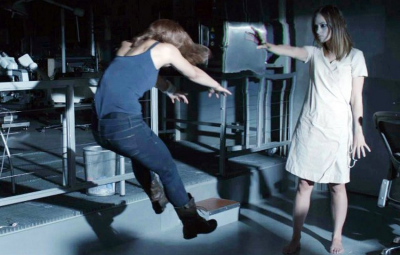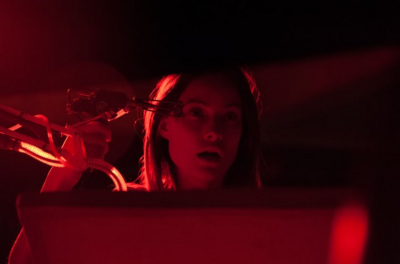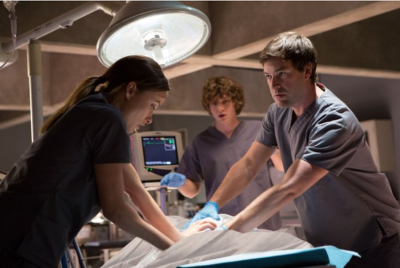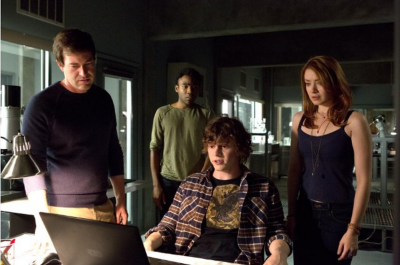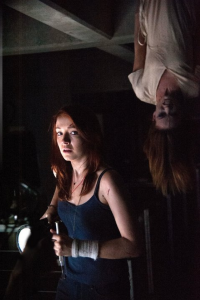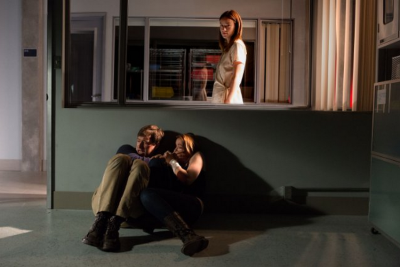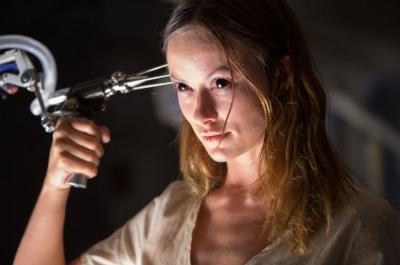As Producer Jason Blum, founder and CEO of Blumhouse knows, I was less than impressed with last year’s “Oculus” which was released under the Blumhouse banner. However, knowing that Blumhouse’s participation in “Oculus” was after the fact and late in the game, I held out hope for the next project, believing it would fall in line with the excellence of the “Insidious”, “Sinister” and “The Purge” franchises (not to mention the non-horror ventures of Blumhouse, like “Whiplash”). My faith was more than rewarded with THE LAZARUS EFFECT. A film filled with stunning metaphoric cinematography, killer sound design and a story rooted in fact and faith that invites reflection and discussion, not to mention some real thrills and heart stopping chills, THE LAZARUS EFFECT rises to the top of the genre with defining elements of fascinating and intelligent subject matter, with technical and performance excellence. Plus, there’s a cute dog!!
Scientific researchers Frank and Zoe have spent the past several years hidden away in a university basement lab obsessed with their latest project: raising the dead. Not a new concept, theologians and scientists alike have been fascinated by and drawn to the idea of resurrection, going back to biblical days as written in the Gospel of John which details the four-day dead Lazarus being miraculously resurrected by Jesus Christ. Since that time, there have been documented historical reports of “resurrection”, as recently as 2013, involving humans and animals alike. Having developed a serum which Frank believes when injected into the brain and electrically charged will resuscitate life, ongoing trials have been conducted on dogs and pigs but without success. Until now.
In a surprising turn of events, Frank, Zoe and their team – computer whiz Niko, freewheeling pot-smoking Clay, videographer Ava – bring a dog, Rocky, back to life. Amidst celebrating this breakthrough, Zoe has second thoughts about what they’ve done. Grounded by her Catholic faith, guilt kicks in, compounding frightening recurring nightmares from her childhood which have intensified the closer the team has come to success. And while at first blush Rocky seems to be a happy normal pup, it doesn’t take long to see that something isn’t quite right with him, fueling even more fear in Zoe. The team as a whole doesn’t seem too impressed by the idea of resurrection or the fact that they have done it; that is, until Clay spends a night with Rocky during which some strange events start to unfold.
While Frank plots their next move, political underpinnings within the university and the project’s funding are called in question and pulled, raising questions about Frank’s code of ethics and exactly what he’s been doing. As a pharmaceutical company comes in with military and governmental efficiency confiscating everything in the lab and all data, Frank and Zoe know they must try and recreate their work or lose all credit for finding the key to life and resurrection.
In a covert late night break-in to the lab, the team makes a hasty recreation with disastrous results leading Frank to push the envelope of scientific discovery even further and resurrect a human life.
Mark Duplass, indie darling in front of and behind the lens, ups his game with his entry into this “new” genre, delivering a solid and mature performance as Frank. Finding that edge between scientific indifference and human emotion, Duplass turns in one of his strongest career performances to date, leaving me wanting to see more. Going toe-to-toe with Duplass is Olivia Wilde who stuns as Zoe. Showing us even more depth and expanded skill set than what we’ve seen in the past from her, Wilde has moments of true fright and then turns on an emotional dime to frightening effect.
In addition to Mark Duplass’ acting, he proved to be invaluable to producer Jason Blum and director David Gelb. An award winning writer, producer and director and one of the gods of indie filmmaking, Duplass’ expertise was “no joke” to Blum and Gelb. According to Blum, “to have someone who wears a directing and producing hat, acting in a movie, is like heaven for a producer because he totally understands the problem of production. . .It’s been a massive asset. We’ve done three movies together and he’s a huge asset on the production side because he “gets” the issues. He’s my hero.”
Real supporting standouts are Donald Glover and Evan Peters as Niko and Clay, respectively. Adding a youthful – and necessary – lightness and touch of inherent humor, their performances demonstrate an effortless ease. Terrific casting cameos come in the form of veterans Amy Aquino and Ray Wise who add a depth and genre gravitas to the proceedings.
And what about Frank and Zoe’s subject canine, “Rocky”? Played by Cato, according to director Gelb, “We had an awesome dog. . .One of the best parts of the pre-production was auditioning the dogs. We had all these terrific dogs and Cato kinda just stood out. He’s got these incredible eyebrows. He’s alternately cute and can be scary at the same time. But, it was a challenge [working with him].”
Giving Gelb props for his staging and direction of Cato, Duplass is quick to note, “It is a challenge [working with animals]. When you’re casting, a lot of times when you’re casting a human role, you’re thinking, “This person has to be an asshole in the movie. Should I cast an asshole just to be an asshole? Or should I cast a nice person and direct them to be an asshole?” Likewise with dogs, you kinda want a nice obedient dog to deal with but at the same time, that dog has to be scary when it comes on set. In the case of Cato, David was really put through the ringer. We had a really nice sweet dog and Cato was really not scary [laughing]. So we really had to figure out how to light it and how to get everything right. That may be [Gelb’s] most successfully directed performance! [He] worked [his] ass off!”
Written by Luke Dawson and Jeremy Slater and directed by David Gelb as his freshman feature, the story of THE LAZARUS EFFECT is well crafted and constructed. Designed as a pseudo-science thriller set against a centuries old religious debate, little details of scientific importance as well as religious iconography are infused into the story with quick visuals planted in the audience’s mind. The debate of religion vs science is extremely well presented without ramming either position down anyone’s throat and creating openings for thought and debate. The issues at the core of the story stay with you long after the curtain has fallen. Characters are extremely well crafted with resonant character traits further fueling the religious and scientific debates.
As a director, Gelb more than proves his mettle. He engages. He invites. He shocks. He rises to the top of the horror heap of directors with the likes of Ti West, James Wan and Adam Wingard. One of Gelb’s most effective skills is his keen visual eye and sensibility. Together with his cinematographer Michael Fimognari, the two develop a visual palette and bandwidth that seamlessly melds lighting, framing and reflection with mirrors and windows to metaphorically and tacitly imbue us with the duality of man, the duality of life and death, the battle of science and religion. Setting the bulk of the film within the confines of two laboratory rooms further adds to the honed claustrophobic focus of the scientific project at hand. This visual construct adds an enhanced layer of storytelling to an already interesting topic.
Where Gelb truly soars with THE LAZARUS EFFECT though, is with his sound design. Doing what directors fear to do and rarely, if ever, do Gelb plunges us into total darkness. No candles, no lights, no shadows. Just pitch black darkness. He then employs sound to tell chapters of the story, calling on the unknown to tap into the imagination and mind of the audience. The effect is chilling. Having already seen the various pieces of set dressing that can be used for sound, the mind reels with every clank, squeak, break, smash only to then be revealed with the sole bright white beam of a flashlight. Gelb takes us into the darkness, into the fear and wraps it around is with singular focus, intensifying the experience.
THE LAZARUS EFFECT elevates the genre, posits questions and raises the terror level to new heights. I am loving LAZARUS!
Directed by David Gelb
Written by Luke Dawson and Jeremy Slater
Cast: Mark Duplass, Olivia Wilde, Donald Glover, Evan Peters, Amy Aquino, Ray Wise

